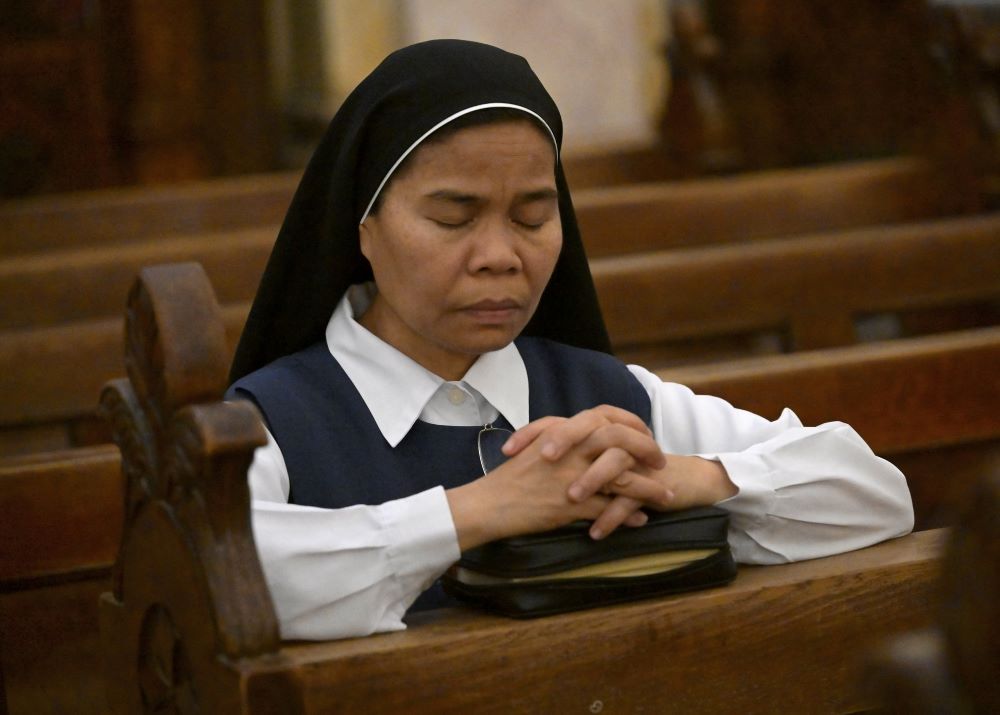
A nun prays in St. Saviour Monastery on the day of prayers and fasting for peace in the Old City of Jerusalem on Oct.17. (OSV News/Debbie Hill)
What is wrong with our world? How can people continue to engage in massive killings and indiscriminate attacks? Why do some think depriving men, women and children of food, shelter, water and fuel will bring about peace? Tears well up and screams of frustration burst forth as I bring to my prayer what is going on in the world.
Throughout the world, smoldering embers from fires started long ago are erupting once more, destroying everything and everyone in their wake. Attempts to put them out only seem to fan the flames more. Even though human consciousness continues to evolve and develop, our response to threats and aggression continues to reflect the choices made by our earliest human ancestors — violence.
We know that violence begets violence. Revenge — "an eye for an eye" — is the attitude and behavior that some humans have certainly chosen when their survival needs were threatened. The belief that might makes right and the lust for power have caused many wars. Over time, such choices became ingrained in the human psyche. We have probably all experienced being angry and wanting to get back at someone who has hurt or threatened us. Sadly, today, for some, anger and revenge become addictions and the automatic response to any insult or aggression. However, in today’s world responding with violence is much more deadly than in previous eras given the weapons available to us. This is especially true at the level of cities, nation-states and third-party actors representing ethnic or religious groups who still react from a more tribal mentality.
Violence has not brought about peace for over 200,000 years of the existence of the human species. Why do we think it will work today? And yet we continue to choose it, over and over again.
Advertisement
Throughout human history, some have challenged such a mentality with a more profound vision of what can be. Jesus challenged us to love one another as we love ourselves and not to take revenge, even on those who were putting him to death. Jesus is joined by other mystics, luminaries and leaders who advocated a nonviolent approach to conflict. These voices inspired millions of us to awaken to a new realization, a new consciousness that began to see each other not as enemies, but rather as all being one, more alike than different, interconnected in this web of life.
To take such a stand, responding out of love and not violence, is thought naïve within the dominant culture. However, a growing consciousness has been evolving and is increasingly emerging.
It is our time in history to live with such chaos and violence. I also believe it is our time in history to accelerate the emergence of the consciousness rooted in love. Entering into contemplative silence opens the space within us to encounter Divine Mystery, to experience the power of Love even in the midst of suffering and sorrow, and to become aware of and free ourselves from our own more base responses to hurt and aggression. This enables us to respond out of love not only in our private lives but in the public sphere as well.
These days, I ponder the vision of Jesuit Fr. Pierre Teilhard de Chardin, who believed that there was a trajectory in evolution toward greater love and unity. Let these words from his book Human Energy offer a different kind of flame to stoke the fires of your contemplative heart.
[W]e are inevitably approaching a new age in which the world will throw off its chains and at last give itself up to the power of its inner affinities. Either we must doubt the value of everything around us, or we must utterly believe in the possibility, and I should now add in the inevitable consequences, of universal love.







